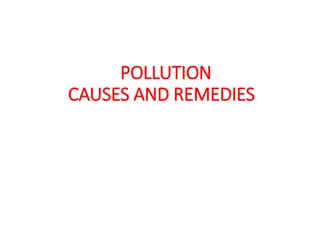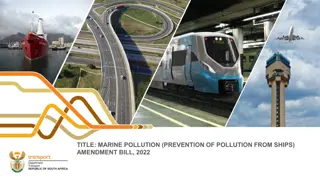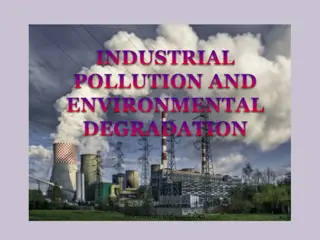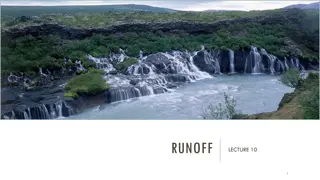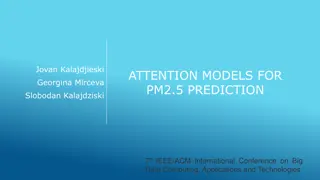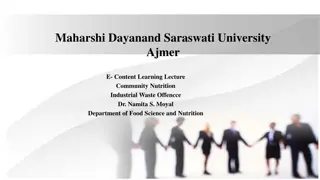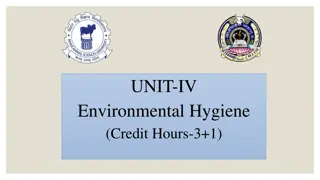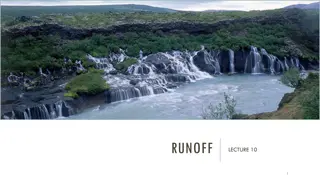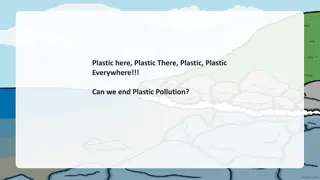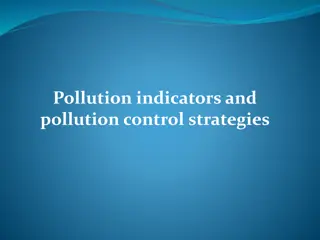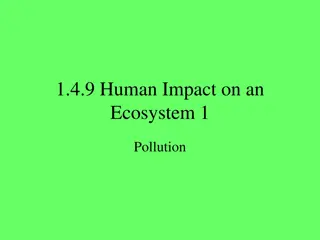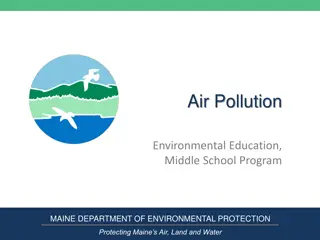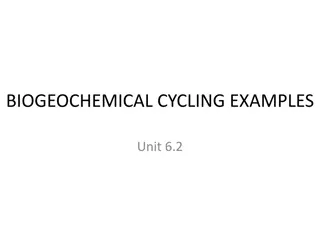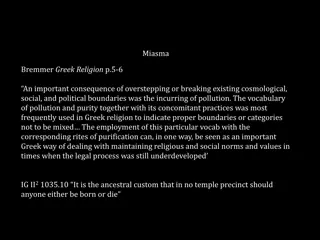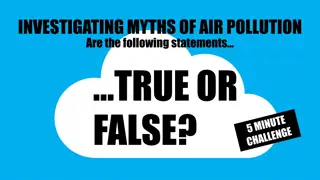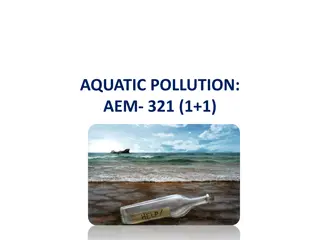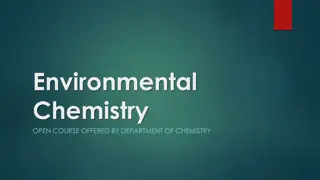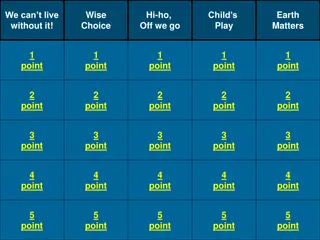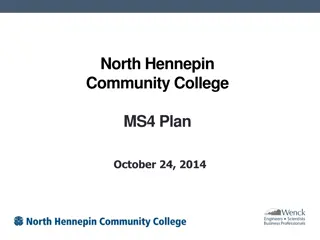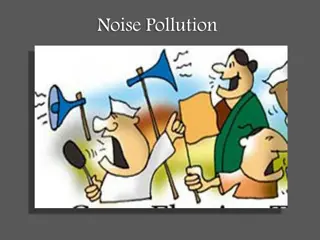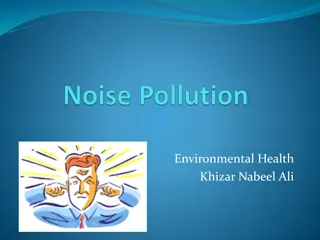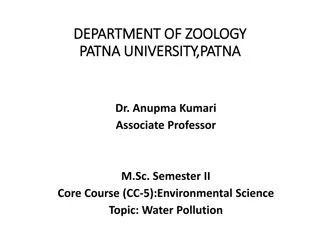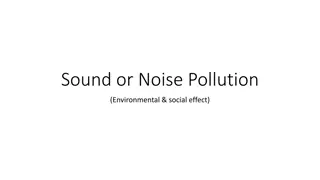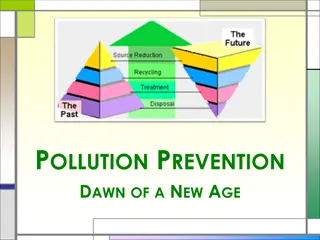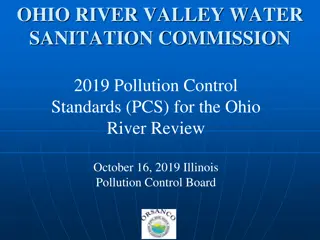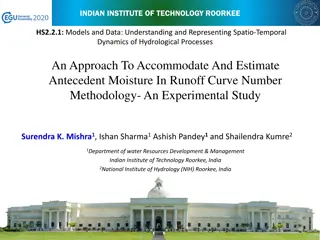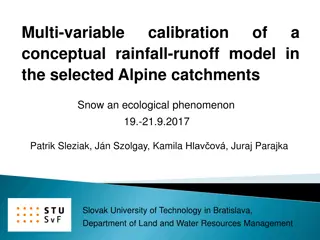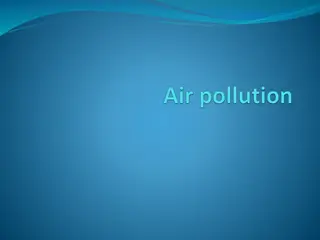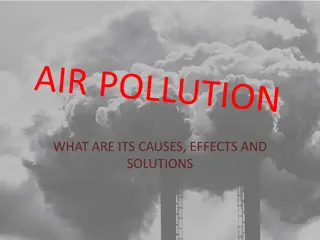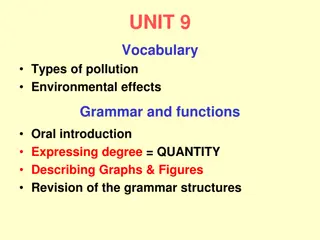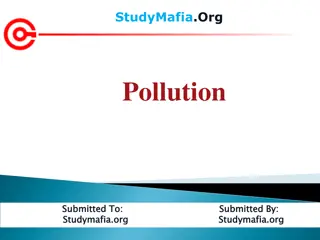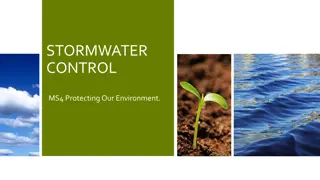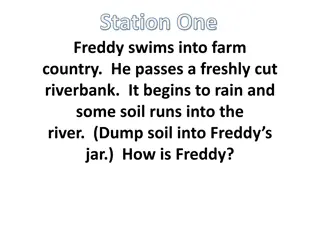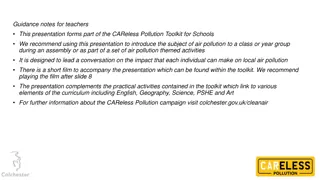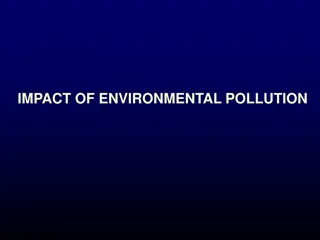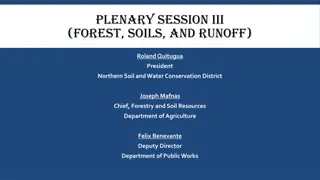Rainfall-Runoff Modelling Using Artificial Neural Network: A Case Study of Purna Sub-catchment, India
Rainfall-runoff modeling is crucial in understanding the relationship between rainfall and runoff. This study focuses on developing a rainfall-runoff model for the Upper Tapi basin in India using Artificial Neural Networks (ANNs). ANNs mimic the human brain's capabilities and have been widely used i
0 views • 26 slides
Understanding Pollution: Causes, Effects, and Remedies
Pollution, whether natural or manmade, refers to undesirable changes in the environment that impact air, water, and land, affecting human life and natural resources. Various pollutants like carbon monoxide, sulfur dioxide, and nitrogen dioxide contribute to air pollution, which can have harmful effe
2 views • 17 slides
Marine Pollution Prevention Amendment Bill Overview
The Marine Pollution (Prevention of Pollution from Ships) Amendment Bill aims to incorporate MARPOL Annex IV and Annex VI to regulate sewage treatment, reduce marine pollution, and address ship energy efficiency and GHG emissions. The bill seeks to enhance environmental protection by restricting sew
5 views • 15 slides
Understanding Different Types of Pollution and Ways to Combat Them
Pollution comes in various forms such as water, noise, air, thermal, and land pollution. Each type has specific sources and impacts. Air pollution, caused by industrial activities and burning of fossil fuels, emits harmful substances into the air. Water pollution occurs due to the discharge of chemi
0 views • 13 slides
Understanding Runoff in Hydrology
Runoff in hydrology refers to surface water flow from precipitation and other sources in drainage basins. It plays a crucial role in stream flow and peak flood formation, influenced by factors like overland flow, interflow, and groundwater flow. This article explores the sources of runoff, including
1 views • 27 slides
Advancements in Air Pollution Prediction Models for Urban Centers
Efficient air pollution monitoring and prediction models are essential due to the increasing urbanization trend. This research aims to develop novel attention-based long-short term memory models for accurate air pollution prediction. By leveraging machine learning and deep learning approaches, the s
0 views • 17 slides
Understanding Industrial Pollution and Waste Management
Industrial pollution, stemming from manufacturing activities, poses a significant threat to the environment. This pollution, including air, water, and soil contamination, results in environmental degradation. Industrial waste, both hazardous and non-hazardous, further compounds the issue, requiring
0 views • 15 slides
Understanding Environmental Hygiene: Air Pollution and Composition of Air
The content delves into the concept of atmospheric pollution, the composition of pure and impure air, sources of air pollution, and the zones of the atmosphere. It highlights the detrimental effects of pollutants on health and the environment, emphasizing the importance of environmental hygiene. The
1 views • 27 slides
Understanding Runoff in Surface Water Systems
Runoff, the flow of precipitation and other contributions in surface streams, plays a crucial role in watershed systems. It encompasses various sources such as surface runoff, interflow, and base flow. Surface runoff, which travels over the ground surface to channels, is influenced by factors like s
1 views • 27 slides
Taking Action Against Plastic Pollution
Plastic pollution is a pressing global issue that harms both the environment and human health. The excessive use of plastic leads to devastating consequences, such as ocean pollution and wildlife endangerment. This article emphasizes the importance of reducing single-use plastics, adopting recycling
0 views • 8 slides
Understanding Pollution: Indicators and Control Strategies
Pollution is a significant environmental issue, yet often misunderstood. This article delves into the definition of pollution, classification, and considerations for effective pollution control strategies. It discusses the UK Environmental Protection Act of 1990, pollutant properties, toxicity, and
2 views • 50 slides
Understanding Pollution and its Ecological Impact
Pollution is any human addition to the environment that disrupts the ecosystem's ability to sustain life. This includes pollutants like CO2 and chemicals from various sources that harm air, water, and land. Different types of pollution such as industrial, agricultural, and domestic pollution have ad
0 views • 25 slides
Understanding Air Pollution and Its Impact on Health and Environment
Air pollution poses a significant threat to human health, the environment, and the economy. The Clean Air Act has played a crucial role in reducing air pollutants since its establishment in 1963. Criteria air pollutants such as ozone, particle pollution, carbon monoxide, lead, sulfur dioxide, and ni
1 views • 11 slides
Understanding Nutrient Pollution and Its Impact on the Environment
Nutrient pollution, characterized by the excess input of nitrogen and phosphorus into water and air, is a significant environmental issue with far-reaching consequences. It can lead to toxic algae blooms, dead zones, economic losses, and adverse effects on human health. The causes of nutrient pollut
2 views • 11 slides
Understanding Pollution and Purification in Greek Religion
The concept of pollution and purification played a crucial role in maintaining religious and social norms in ancient Greek society. Breaking boundaries or defying societal expectations could lead to pollution, necessitating purification rituals. Examples of actions that could cause pollution include
0 views • 7 slides
Debunking Myths About Air Pollution
Explore the truth behind common misconceptions about air pollution through a series of statements. Learn about the impact of vehicle emissions, indoor air quality, health effects of polluted air, and the role of trees in combating pollution. Uncover the facts to better understand the challenges of a
1 views • 8 slides
Understanding Aquatic Pollution and Its Impact on Water Quality
Aquatic pollution is a significant concern affecting the environment and human health. It includes various pollutants entering water bodies from land-based activities, causing harm to aquatic life and humans. Pollution sources can be classified into point source and non-point source. Monitoring wate
2 views • 13 slides
Comprehensive Environmental Chemistry Open Course Overview
This open course offered by the Department of Chemistry covers various aspects of environmental chemistry, including air and water pollution, soil pollution, noise pollution, thermal pollution, and radioactive pollution. Students will learn about the causes and effects of different types of pollutio
3 views • 9 slides
Understanding Hyetograph, Runoff, and Hydrograph in Hydrology
A hyetograph represents rainfall intensity over time, crucial for predicting extreme floods. Runoff is the unevaporated portion of rainfall that flows into rivers or oceans, while hydrograph displays discharge variations over time in streams. Surface runoff, interflow, and base flow are key classifi
0 views • 15 slides
Understanding Air Pollution and Its Impact on Health
Discover the importance of Earth's air quality and how pollution affects our health. Explore the respiratory system, the effects of air pollution on different groups like athletes and seniors, and the significance of green spaces in combating pollution. Learn how to check your community's air qualit
0 views • 52 slides
Understanding Pollution Impact on Watersheds
The content covers the impact of human activities on watersheds, focusing on pollutants like oil, nutrients, and bacteria. It emphasizes the importance of protecting watersheds and offers solutions to prevent pollution. Examples include oil runoff affecting drinking water sources and nutrient pollut
0 views • 7 slides
Managing Urban Stormwater Runoff: North Hennepin Community College MS4 Plan
North Hennepin Community College is designated as an MS4 due to its location in an urban area, aiming to treat urban stormwater runoff and improve water quality. The MS4 Plan includes implementing six minimum control measures, such as public education, illicit discharge detection, and construction s
0 views • 10 slides
Understanding Noise Pollution: Sources, Terminology, and Measurement
Noise pollution is defined as undesirable sounds that disrupt human and animal life. This article explores the sources of noise pollution, terminology used in its measurement, and its impact on urban environments. Major sources include traffic noise, industrial machinery, and household activities. U
1 views • 26 slides
Understanding the Impact of Noise Pollution on Health and Environment
Noise pollution is a prevalent issue affecting our health and environment. It includes unwanted sound that disrupts daily activities, leading to various health problems like hearing loss, high blood pressure, stress, and more. This pollution stems from both outdoor sources like construction and road
0 views • 27 slides
Understanding Water Pollution and Its Impact on the Environment
Water pollution is a significant environmental issue caused by the contamination of water bodies with toxic substances like chemicals and microorganisms. This degradation in water quality poses risks to both humans and ecosystems. The pollutants stem from various sources such as agricultural runoff,
0 views • 59 slides
Understanding Sound Pollution: Causes, Effects, and Solutions
Sound pollution, caused by various sources such as traffic, construction, industrial activities, and household equipment, disrupts the natural balance and affects both the environment and human health. This pollution can lead to hearing impairment and other detrimental effects over time. Awareness o
0 views • 14 slides
POLLUTION PREVENTION: A Closer Look at Environmental Initiatives in Oklahoma
Explore the evolution and implementation of pollution prevention measures in Oklahoma, focusing on statutory directives, recent activities, recycling efforts, tax credits, and more. The Pollution Prevention Act of 1990 plays a crucial role in reducing environmental hazards through the reduction of p
0 views • 31 slides
Review of ORSANCO Pollution Control Standards for the Ohio River
The Ohio River Valley Water Sanitation Commission (ORSANCO) was formed in 1948 to control interstate water pollution in the Ohio River basin. It is governed by Commissioners from eight states and federal representatives. Key provisions of ORSANCO's Compact include cooperation in pollution control, m
0 views • 10 slides
Understanding Spatio-Temporal Dynamics of Hydrological Processes at IIT Roorkee
This study conducted at the Indian Institute of Technology Roorkee focuses on modeling and understanding hydrological processes, particularly in estimating antecedent moisture in the Runoff Curve Number methodology. The research delves into the historical background of the Soil Conservation Service
0 views • 13 slides
Calibration of Multi-Variable Rainfall-Runoff Model Using Snow Data in Alpine Catchments
Explore the calibration of a conceptual rainfall-runoff model in Alpine catchments, focusing on the importance of incorporating snow data. The study assesses the benefits of using multi-objective approaches and additional datasets for model performance. Various aspects such as snow cover, groundwate
0 views • 16 slides
Understanding Air Composition and Pollution
The composition of the dry atmosphere by volume, primary and secondary pollutants, and the impact of human activities on air quality are discussed. Various gases present in the atmosphere, sources of pollution, and the belief that natural elements are clean until polluted are explored. Different nat
0 views • 31 slides
Understanding Air Pollution: Causes, Effects, and Solutions
Pollution is the harmful introduction of contaminants into the environment, caused by human activities and natural disasters. It impacts all living organisms, making it challenging to sustain life. Air pollution, a major form of pollution, occurs when pollutants such as gases, dust particles, and fu
0 views • 8 slides
Understanding Pollution: Types, Effects, and Solutions
Explore the various types of pollution, the environmental effects caused by human activities, and learn about expressing quantity and degree in this comprehensive unit. Discover how pollution contaminates the air, land, and water, and the importance of conservation efforts and new technologies in re
0 views • 25 slides
Understanding Pollution: Types, Causes, and Impacts
Pollution is the introduction of harmful substances or energy into the environment, leading to adverse changes in living entities. It can be caused by various factors such as chemical pollutants and energy forms like sound and light. This article discusses different types of pollution including air,
0 views • 25 slides
Understanding Stormwater Management and Best Management Practices
Stormwater management is crucial for protecting our environment from pollutants in runoff water. Best Management Practices (BMPs) are a combination of structural, vegetative, and managerial techniques used to prevent water pollution and improve water quality. Learn about stormwater pollution, minimu
0 views • 15 slides
Freddy's Environmental Adventure Along the River
Follow Freddy's journey along the river as he encounters various sources of pollution such as soil runoff, fertilizer, oil leakage, salting, trash, factory pollution, wastewater treatment plant breakdown, and hazardous waste dumping. Each scenario demonstrates the harmful effects of human activities
0 views • 9 slides
Addressing Air Pollution in Schools: A Presentation and Toolkit Overview
Introduction to air pollution using a presentation from the CAReless Pollution Toolkit for Schools. Covers what air pollution is, its causes, and the specific impact on areas like Colchester and schools. Aimed at starting a conversation on individual actions to combat local air pollution, complement
0 views • 16 slides
Drawbacks of City Living: Traffic Jams, Pollution, and Overcrowding
Living in a city presents several challenges including traffic jams due to increasing population, pollution affecting health and the environment, and noise pollution from construction activities. These factors make city life difficult for residents. The content discusses the drawbacks of city living
2 views • 8 slides
Understanding the Impact of Environmental Pollution
Environmental pollution, caused by the introduction of contaminants into the air, water, and soil, has detrimental effects on ecosystems and human health. This pollution includes air pollution from various sources like combustion and industrial processes, leading to the formation of harmful pollutan
0 views • 61 slides
Plenary Session III on Forest, Soils, and Runoff Featuring Key Speakers
The Plenary Session III on Forest, Soils, and Runoff showcased insights from prominent figures such as Roland Quitugua, President of the Northern Soil and Water Conservation District, Joseph Mafnas, Chief of Forestry and Soil Resources at the Department of Agriculture, and Felix Benevante, Deputy Di
0 views • 4 slides

